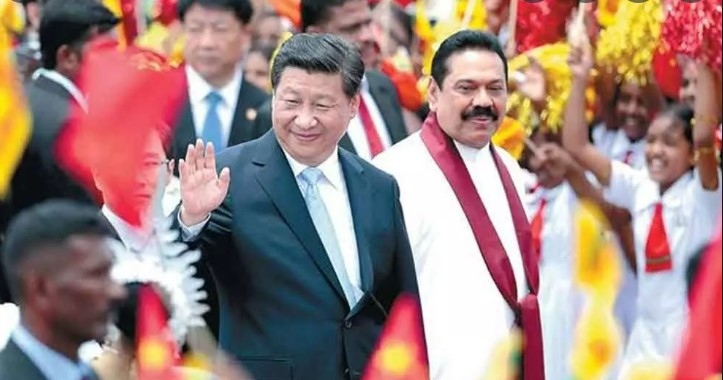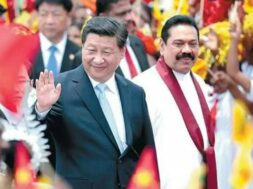
Roving Periscope: China mulls to ‘teach a lesson’ to broke Sri Lanka, Pakistan!
Virendra Pandit
New Delhi: Is China preparing the ground for ‘teaching lessons’ to its allegedly ungrateful South Asian debtors, Sri Lanka and Pakistan?
For, the growing chorus in China’s state-controlled official narrative is that Sri Lanka, like most other South Asian nations, is “scheming and opportunist.”
Remember the “Hindi-Chini Bhai Bhai” rhetoric in the late 1950s and the Chinese attack on India in 1962 to ‘teach it a lesson?’
Six decades later, China is mulling a similar step against an ‘ungrateful’ Sri Lanka, which was its “all-weather friend and partner” until six months ago. “China doesn’t ow Sri Lanka anything,” and that “Belt and Road Initiative (BRI) is not “free relief” for laggards or insincere partners, the narrative informs.
According to an article published by the Observer Research Foundation (ORF), the narrative-builders have flooded the Chinese internet with condemnations of Sri Lanka’s “victim rhetoric” as the state-controlled networks prepare a ground for the next step against Colombo. There is nothing unofficial in China, its publications, propaganda, and the internet ecosystem which, together, work to justify or prepare the grounds for the authoritarian Communist government’s steps.
That is why Beijing’s allegations that Sri Lanka used it as an “ATM” and that it is now “publicly embarrassing China” are indicators of what China might do against the island country. Among the epithets quoted in the Chinese narrative which Beijing is using against Colombo are “backstabber,” “ungrateful,” “capricious,” “completely untrustworthy,” and “treacherous,” etc. Together, these sins of Sri Lanka make it “unworthy of China’s pity and assistance.”
After this diatribe, China is making out a case. “It is time for Sri Lanka to be taught a lesson and made to pay a heavy price.”
The Chinese propaganda claims that when Sri Lanka encountered the economic crisis, China had ‘originally’ offered to negotiate on the Chinese debt, extend the repayment period, help in the “new debt to repay the old debt” type of restructuring, and had even been willing to provide Sri Lanka’s USD 1 billion sovereign bonds—on condition that Colombo steps up cooperation with Beijing.
What kind of cooperation?
On January 10, just before the upcoming 14th round of China-India military commander-level talks, Chinese State Councillor and Foreign Minister Wang Yi visited Sri Lanka. He floated the idea of holding a ‘development forum of Indian Ocean countries’, which aimed at gathering consensus, forming synergy, and thus “stringing the pearls together” in the Indian Ocean Region (IOR) under Chinese leadership.
He said this was part of China’s ‘global development initiative’ proposed by President Xi Jinping in September 2021, especially meant to address the development needs of the IOR island countries and their post-pandemic recovery and sustainable development.
Wang Yi also proposed that China and Sri Lanka should use the “dual-engine role of Colombo Port City and the Hambantota Port,” collaborate under the Regional Comprehensive Economic Partnership Agreement (RCEPA) and discuss the re-start of the China–Sri Lanka Free Trade Agreement negotiations, to release important signals to the outside world (particularly to India).
Chinese analysts argued that for China, a few billion dollars in loan to Sri Lanka is nothing compared to the role it could play in containing India in South Asia, enhancing China’s influence in the IOR, and successfully implementing the BRI.
However, these proposals made little headway. China was ‘disappointed’ as Sri Lanka suspended foreign debt payments in April, defaulted on its debts in May, declared bankruptcy in July, and went to the International Monetary Fund (IMF) for help. These decisions were detrimental to Beijing, causing serious economic losses to China.
China wanted Sri Lanka to keep repaying its debts and helped it secure better deals at the international financial institutions to ensure the repaid money continued flowing into the Chinese coffers. But Sri Lanka’s steps, taken “under Western/Indian influence,” had now positioned the island country as an “economic enemy” of China and forced it to offer debt relief to Sri Lanka under unfavorable IMF conditionalities.
Beijing opposed the IMF’s condition of debt haircut, which required the creditors to voluntarily forgive an equal amount of debt, on grounds that it will be a bigger loss for a creditor of new debts like China. In contrast, most of Sri Lanka’s existing debt is “old debt.”
China suspected Colombo wanted to benefit from it but remained highly vigilant against Chinese influence. Colombo refused to carry out substantive and in-depth cooperation, as China expected. It has a long history of flip-flops on the China issue, and now, even while getting bailed out, it is swinging between China, the West, and India.
Therefore, although Sri Lanka remains an important fulcrum of the Maritime Silk Road (MRS), it must not be allowed to hold the BRI to ransom and use it as a bargaining chip to force China to repay Sri Lanka’s debt to the West, India, US, Japan, and others.
After all, the bankruptcy of Sri Lanka, China claims, will not be the end of this crisis but is most likely just the beginning. And, the disposal of Sri Lanka’s debt is most likely to set a precedent for other debtors and affect the settlement of China’s and other countries’ debts vis-à-vis multiple nations. China, therefore, must not allow itself to be a “scapegoat “but scuttle Sri Lanka’s bid to obtain IMF help.
Sri Lankan leaders, including ex-President Gotabaya Rajapaksa, Colombo’s Ambassador to China Palitha Kohona, and others, have publicly raised concern over the lack of Chinese interest in helping Sri Lanka. This also infuriated China.
Such Sri Lankan moves, Beijing believes, strengthened the western/Indian discourse of Chinese culpability in Sri Lanka’s debt crisis and the economic crisis currently faced by several other developing countries. It is building up international pressure on China to align its stance with the Paris Club and re-consider its position on the ‘Common Framework for Debt Treatment.’
All this while, the report said, China is trying to stall the G-20 debt relief plan for distressed countries because it wants to “cut its debt deals” with these nations before the G-20 Common Framework for Debt Treatment” process is fully implemented.
If Sri Lanka wants more money from China, it must repay the previously owed money, fulfill its obligation to ensure the safety of Chinese investments in the country, and not play the game of “moral kidnapping.”. The Chinese argued it must bargain from its position of a bankrupt country and not like some gold dust, trying to balance various forces, seeking to benefit from all.
The popular discourse in China on the Sri Lankan crisis is that Sri Lanka must pay back or face consequences. For debt recovery, Chinese warships may take control of the Colombo port and make it yet another Chinese port in Sri Lanka, like Hambantota.
Alternatively, Beijing could force Colombo to allow the Chinese Navy to use Sri Lankan ports for supplies, maintenance of warships, and dedicated piers for Chinese warships. Like Djibouti, they may also force Colombo to agree to transfer rights for constructing a military base in the island nation.
This has alarmed Sri Lanka and some in Pakistan as well.
When top Pakistani Army officials visited China in June, Beijing displayed reservations about the safety of the USD 60 billion China-Pakistan Economic Corridor (CPEC) and the Chinese staff. For this purpose, China has demanded military outposts in Baluchistan.
No wonder some Pakistani intellectuals suspect the CPEC is the equivalent of the East India Company that ruled the Indian subcontinent for nearly a century until 1857.













